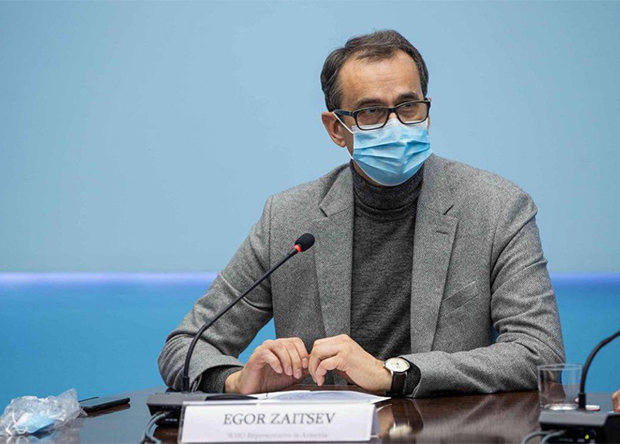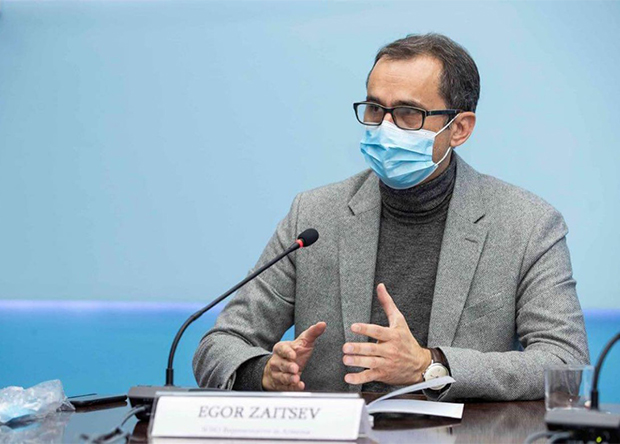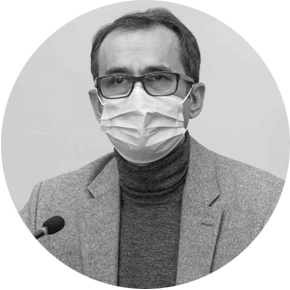World Immunization Week is celebrated every year in the last week of April. It aims to promote the use of vaccines to protect people of all ages against disease.
The topic of vaccination has recently been in the center of public discussions, as they are offered as an effective tool to fight COVID-19 pandemic. How effective are COVID-19 vaccines? Are they safe? Will they end the pandemic? We talked about all these issues with Egor Zaitsev, WHO Representative in Armenia.
Mr. Zaitsev, let’s start from the question that is interesting for everyone. Will vaccination make us finally return to our normal life?
The impact of COVID-19 vaccines on the pandemic will depend on several factors. These include how quickly they are manufactured, delivered and deployed; the possible development of other variants of concern and how many people get vaccinated. WHO is working to ensure fair distribution of vaccines through COVAX FACILITY. However, this pandemic still has a long a way to run: Intense transmission is ongoing and is putting enormous pressure on hospitals, intensive care units and health workers. Decisions made by leaders and citizens in the coming weeks will determine when the acute phase of the pandemic will end.
Safe and effective vaccines are gamechangers: but for the foreseeable future we must continue wearing masks, physically distance and avoid crowds. Being vaccinated doesn't mean that we can throw caution to the wind and put ourselves and others at risk.
What are the benefits of being vaccinated?
The COVID-19 vaccines produce protection against the disease, as a result of developing an immune response to the SARS-Cov-2 virus. Developing immunity through vaccination means there is a reduced risk of developing the illness and its consequences. This immunity helps you fight the virus if exposed. Getting vaccinated may also protect people around you, because if you are protected from getting infected and from disease, you are less likely to infect someone else. This is particularly important to protect people at increased risk for severe illness from COVID-19, such as healthcare providers, older or elderly adults, and people with other medical conditions.
Can people stop taking precautions after being vaccinated?
Vaccination protects people from getting seriously ill and dying from COVID-19. For the first fourteen days after getting a vaccine, one does not have significant levels of protection, then it increases gradually. For a single dose vaccine, immunity will generally occur two weeks after vaccination. For two-dose vaccines, both doses are needed to achieveto provide the highest level of immunity.
 Egor Zaitsev
Egor Zaitsev
While COVID-19 vaccine will protect you from serious illness and death, we still don’t know the extent to which it keeps you from being infected and passing the virus on to others. To help keep others safe, continue to maintain at least a 1-metre distance from others, cover a cough or sneeze in your elbow, clean your hands frequently and wear a mask, particularly in enclosed, crowded or poorly ventilated spaces. Always follow guidance from local authorities based on the situation and risk where you live.
It seems that now public discourse is more about vaccines safety rather than efficiency. Are vaccines safe?
Ensuring the safety and quality of vaccines is one of WHO’s highest priorities. WHO works closely with national authorities to ensure that global norms and standards are developed and implemented to assess the quality, safety and efficacy of vaccines.
The process to develop COVID vaccines is fast-tracked while maintaining the highest standards: Given the urgent need to stop the pandemic, pauses between steps, often needed to secure funding, have been shortened, or eliminated, and in some cases, steps are being carried out in parallel to accelerate the process, wherever that is safe to do. COVID-19 vaccine developers have issued a joint pledge not to seek government approval for their vaccines until they’ve been proven to be safe and effective.
There are many strict protections in place to help ensure that COVID-19 vaccines are safe. Like all vaccines, COVID-19 vaccines are going through a rigorous, multi-stage testing process, including large (phase III) trials that involve tens of thousands of people. These trials, which include some groups at high risk for COVID-19 (certain groups like pregnant and lactating women were not included in vaccine trials), are specifically designed to identify any common side effects or other safety concerns.
Once a clinical trial shows that a COVID-19 vaccine is safe and effective, a series of independent reviews of the efficacy and safety evidence is required, including regulatory review and approval in the country where the vaccine is manufactured, before WHO considers a vaccine product for Emergency Use Listing (EUL) or prequalification. EUL or Prequalification verifies to those countries that would want to procure a particular vaccine that there has been an assurance by WHO that the regulatory review process, usually in the country of manufacture, has held up to the highest standards. Part of this process also involves a review of all the safety evidence by the Global Advisory Committee on Vaccine Safety.
An external panel of experts convened by WHO analyzes the results from clinical trials, along with evidence on the disease, age groups affected, risk factors for disease, and other information. The panel recommends whether and how the vaccines should be used. Officials in individual countries decide whether to approve the vaccines for national use and develop policies for how to use the vaccines in their country based on the WHO recommendations.
After a COVID-19 vaccine is introduced, WHO supports work with vaccine manufacturers, health officials in each country, and other partners to monitor for any safety concerns on an ongoing basis.
And what can you say about AstraZeneca vaccine?
Serious side effects from vaccines are extremely rare. It is important to remember that we are witnessing they largest mass vaccination campaign in history and some rare reactions are to be expected.
The AstraZeneca vaccine is very effective in preventing severe disease and death due to COVID-19 in adults of all ages. The benefits of vaccination continue to overweigh any risk.
 Egor Zaitsev
Egor Zaitsev
As of 22 nd April, 900 million doses have been administered worldwide with very few serious side effects. A very rare but serious side effect (blood clotting with low platelets) may occur after a first dose. Initial experience shows it occurs in about 4-6 people in a million, it appears less likely in older adults than younger adults – but remains very rare. The benefits of vaccination are far greater than the risk of the rare side effect. In addition to the benefits in preventing severe disease and death due to COVID-19, the vaccine offers protection against overall COVID-19 and complications from ‘long COVID’ and death, protection potentially for close contacts and the community, by preventing transmission, reduction of risk of severe disease from some variant strains of the virus. The use of the vaccine continues to be recommended (for groups prioritized).
Would you get COVID-19 vaccine yourself?
I will, for sure. The vaccines are public good and they protect us and our loved ones. My parents are over 65-year-old and my mother is already vaccinated. At the moment it is critical that countries ensure access to vaccines to the most vulnerable groups, that are more likely to develop serious disease and die. This way it allows to seriously decrease number of severe cases, decrease mortality and decrease burden on our health systems, doctors and nurses to allow them manage many other patients with multiple but no less serious conditions.



























Comments
Dear visitors, You can place your opinion on the material using your Facebook account. Please, be polite and follow our simple rules: you are not allowed to make off - topic comments, place advertisements, use abusive and filthy language. The editorial staff reserves the right to moderate and delete comments in case of breach of the rules.